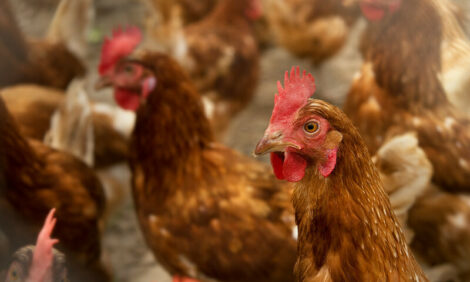



Extension, Teaching Will Play Roles to Combat Salmonella
US - Drs Hosni Hassan and Matt Koci, from NC State’s departments of microbiology and poultry science, respectively, are leading the charge on a new five-year, $2.5 million grant from the United States Department of Agriculture National Institute of Food and Agriculture (USDA-NIFA) to stamp out salmonella.
But this isn't your ordinary research grant. Their approach – along with partners at UNC-Chapel Hill, the Kenan Fellows program and North Carolina 4-H – involves research, teaching and extension.
"The research is aimed at trying to develop new ways of preventing poultry from getting colonized by salmonella, so then the poultry products the consumer comes in contact with are less likely to be capable of causing foodborne illness," said Dr Koci, associate professor of poultry science in the College of Agriculture and Life Sciences.
Through the Kenan Fellows program and 4-H, Drs Hassan’s and Koci’s research eventually will be delivered to youth throughout the state and nation.
"The K-12 teachers will spend time in each of our labs learning a different area of science," said Dr Hassan, CALS professor of microbiology. "Then they will develop lessons that will be made available to schools statewide, in essence carrying research from the lab all the way to the consumer and future farmers."
And, according to Dr Koci, 4-H will work to adapt the curricula for their clubs throughout the state and also will ensure that it meets national 4-H standards so that it may be taught to young people all over the US.
The seed for the project "started with a lunch" about five years ago, Dr Hassan said.
In 2007, Dr Hassan’s lab patented a gene mutation that attenuates salmonella. He teamed with Dr Koci that same year to begin experiments on a potential salmonella vaccine. In 2011, they won a Chancellor’s Innovation Fund award for this work. The awards were created by NC State Chancellor Randy Woodson to provide additional support to faculty, staff and students who develop technologies or ideas with commercial potential. Drs Hassan and Koci also received a grant that year from the North Carolina Biotechnology Center (NCBC).
"This USDA project is an extension of the work we’ve been doing for the Chancellor’s Innovation Fund and the NCBC grant," Dr Koci said. "Our work up until now has largely focused on using the mutant strain that Dr Hosni developed as a vaccine in chickens, and now we’re expanding our work to try to manipulate the normal bugs that live in the gut in a way that provides more resistance to salmonella. So we’ll try that in combination with the vaccine or by itself to find the best way to drive salmonella numbers as low as we can get them."
It comes down to good bugs and bad bugs, Dr Hassan said. "You find some people who can eat the same dish and one gets sick and the other doesn’t get sick, so there must be something about the gut flora that causes this dichotomy. So we’re trying to define that flora in the chicken and see if we can do more to enhance this flora and find out if that will resist salmonella.
"We’re also looking at how the vaccine will interact with natural microflora,” Dr Hassan said. "So we’re really looking at both the health of the chicken and of the consumer."
The Kenan Fellows program will bring nine K-12 teachers from area schools to campus this summer to work alongside Drs Hassan and Koci in their labs. The teachers then will develop curricula that they eventually pilot in their own classrooms. At the end of the program, their curricula will be published so that teachers throughout the state can use it.
At the same time, 4-H professionals will work with the Kenan Fellows to adapt the curricula for 4-H clubs statewide. Drs Hassan and Koci estimate that the curricula – which likely will focus on topics like food safety, disease prevention and immunization – should land in classrooms within the next two to three years.
"There’s also a neat component in the grant through the computer engineering department to develop a computer game to be part of the 4-H and Kenan Fellows teaching tools," Dr Hassan said.
"Our goal is to educate the public about salmonella and how to avoid it," Dr Hassan said. "People need to be educated about food safety and proper food handling, but they also need to understand how salmonella works and how it can make them sick.
"We’re also working to develop a safe product, so that what’s applied to the chicken can be applied to other farm animals as well," he said.
Salmonellosis (the disease caused by salmonella) is a largely preventable disease that could be avoided if people were to practice better food safety, Dr Koci said.
"We can do everything we can to minimize risks as much as possible, but food production happens on such a scale that even a small fraction of people will continue to get sick," Dr Koci said. "The only way we’re ever going to stamp it out completely is to focus on both the science and consumer education and attack it from both angles."











